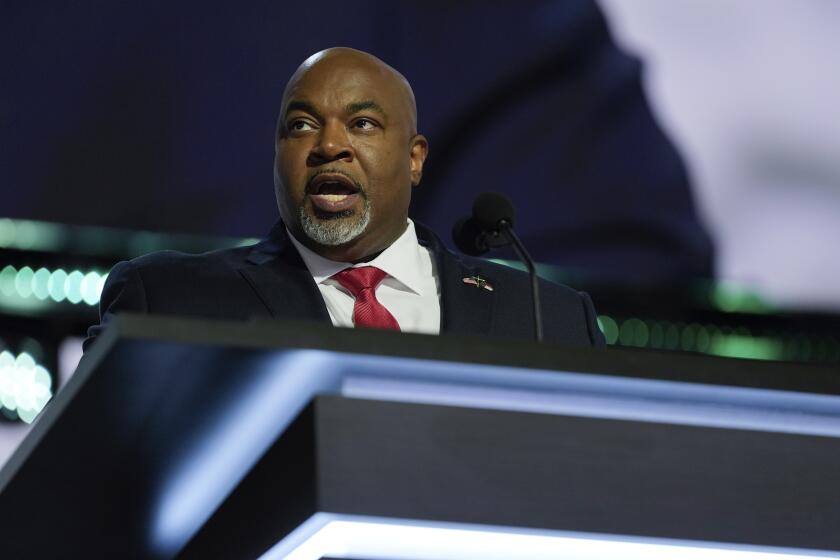McManus: Doomsday doubters and the debt ceiling
President Obama says that if Congress doesn’t raise the debt ceiling by Aug. 2, the consequences will be dire. A long list of economists and the U.S. Chamber of Commerce agree. Even the Republican leader in the U.S. Senate agrees.
But there’s also another view.
Many House Republicans — even those who believe the debt ceiling must be raised — aren’t buying the doomsday scenario. And they’re not willing to allow more borrowing without deep and enforceable spending cuts.
Let’s hear from one of them in his own words.
“My top priority is reducing the size and scope of government,” said Rep. Ben Quayle (R-Ariz.). “Those of us who are new to Congress believe that’s what we’re doing here. That’s what the 2010 election was about.”
Quayle, 34, is the son of former Vice President Dan Quayle, who served under President George H.W. Bush almost two decades ago. The younger Quayle’s run for Congress last year from the suburbs of Phoenix was his first political campaign. He won easily in a solidly Republican district (conservative icon Barry Goldwater, the 1964 Republican candidate for president, once lived there) by promising that he’d be a reliable conservative vote. He has his mother’s dark features but his father’s earnest, soft-spoken manner.
Quayle was elected with “tea party” support, but he’s not a bomb-thrower; he says he’s willing to vote for an increase in the debt ceiling at some point. “I do not want to have a default,” he said. But he’s not willing to compromise easily. The debt ceiling, he says, gives conservatives the leverage they need to force deep spending cuts. “This is the time for us to rein in federal spending,” he said.
But that’s not the only factor holding Quayle and other House Republicans back, he said. Past budget deals, including some negotiated by Republican presidents, have often promised spending cuts, but when the time came for spending to be reduced, Congress backed down.
“I’m reminded of 1991 when President [George H.W.] Bush agreed to a tax increase,” he said. “The spending decreases never materialized.” Quayle’s father lobbied against those tax increases. (Rep. Quayle was a 14-year-old high school freshman then, and admits that he wasn’t following the issue as closely as he is now.)
And there’s a deep divide of mistrust between House conservatives and the Obama administration. Like many Republicans, Quayle says he’s skeptical of the administration’s claims that Aug. 2 is a real drop-dead date and that the consequences of failing to raise the debt ceiling would be catastrophic.
“There has been a lot of fear-mongering coming out of the administration,” he said. Even if the debt ceiling doesn’t rise, he said, “I believe we can still pay the interest on our debt, pay Social Security and Medicare, pay military salaries and veterans’ benefits. And they can do some prioritization after that.”
Quayle says his constituents back home in Phoenix expect him to rein in the budget — and to hang tough.
“Some don’t want us to raise the debt ceiling at all,” he said. “I tell them that even though we don’t like the debt that’s been accumulated, we need to honor it. You have a teenager who misuses a credit card, you tear up the card, but you still have to pay the bill.”
The pressure that House members like Quayle feel helps explain why it has been so difficult for Speaker John A. Boehner (R-Ohio) and other GOP leaders to find a deal that can pass.
The American public as a whole may want Congress to compromise, but conservative Republican voters — the ones who sent Quayle to Washington — aren’t persuaded yet.
An NBC/Wall Street Journal poll released this week found that a majority of voters want their members of Congress to make a deal on the issue — but not Republicans or tea party supporters. Among Republicans, 52% wanted their party to stand firm; among tea party supporters, the number opposing compromise was almost 70%. Leaders of several tea party groups have already warned that they will try to unseat any Republican who settles for too easy a deal.
Quayle, like a lot of his colleagues, sounds as if he’d prefer a deal to no deal. “But I want to make sure the deal is a good one,” he said. What does that mean? Spending cuts with some kind of enforcement mechanism to make sure they happen — and no tax increases.
Quayle and his fellow Republicans have come a long way by holding together as the party of no. They’ve forced Obama and congressional Democrats to consider spending cuts of $3 trillion or more over 10 years, including significant cuts to the bedrock Democratic programs of Social Security and Medicare. But they don’t seem sure what their own bottom line is.
The question now is: Can they agree to a deal that includes much of what the tea party asked for, but not all of it? Can the party of no find a way to say yes? And can they do it in the few days remaining before Aug. 2?
They face a difficult, fundamental choice — and time is very short.
More to Read
Sign up for Essential California
The most important California stories and recommendations in your inbox every morning.
You may occasionally receive promotional content from the Los Angeles Times.











